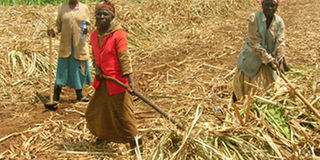Sugar Bill: Busoga leaders should explore investment alternatives

Mr Simon Isabirye, 60, a father of five children, has been a committed sugarcane farmer. Like many smallholder farmers in Busoga, he lives in a one-room grass-thatched house. And this is all he can show today after growing sugarcane for more than 20 years, an activity he inherited from his deceased father. Little does Mr Isabirye know that President Museveni last week rejected the Sugar Bill, a move that further condemns sugarcane growers to an endless cycle of poverty, while it turns sugar managers and merchants into instant millionaires.
The question as to what economic activity will lift Busoga sub-region from the poverty pit they are in now comes to the fore as we head to general election in 2021. Busoga leaders need to use this electioneering period to demand investment alternatives, especially for the young people. Short of this, many Basoga such as Isabirye, who constitute a new generation of sugarcane growers in the sub-region, will also inherit growing a cash crop that has zero returns, but which has ironically created multi-millionaires within the chain.
The essence of opening other sugar factories in Kamuli, Kaliro and Mayuge districts was to offer farmers choices depending on price. Indeed, the pricing formula in the Sugar Bill was a big win.
Short of this, no single sugarcane farmer will ever discourage themselves off this “thankless” and cashless cash-crop to majority of the farmers. The sugar giants cited by the President will continue to control the price while working with a chain of cartels at the apex of the farmer association. At least our leaders should propose something better for their suffering people.
Today, talk to any sugarcane farmer and they will tell you how it begins from the garden. The farmers lose either by supplying more or less sugarcane to factories. Either way, when there is less supply, the factories do not make much money hence it can’t pay them and when there is an oversupply, harvesting is not done in time and they are delivered when the cane nearly have no value. Sometimes, the canes are harvested and left to dry and lose juice in the process and hence earn less.
Given the importance of agriculture for the livelihood of the ordinary poor, policies and activities aimed at improving the lives of these people, need to include agricultural development elements, especially for already impoverished regions like Busoga.
We should push for a conversation on how sugarcane price are set, when to buy it, when to be paid arrears, licensing to supply sugarcane and the integrity of the leadership of the sugar associations. We should ask question like why farmers have failed to even galvanize themselves into a SACCO.
Tom Magumba,
[email protected]




